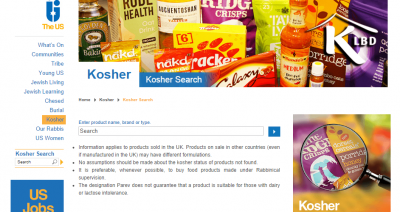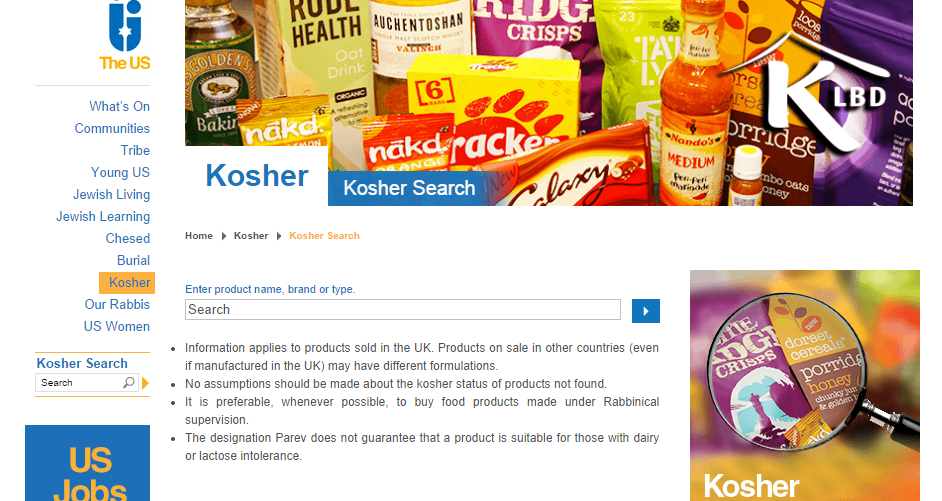
In the US, those of us who keep kosher in any form (and yes, that means many things) are used to kashrut wars. Is Does said person keep to that seal? Is this food OK, or is it Star-K? Will a thousand demons eat me if I have a block of Triangle-K cheddar? In short, the wrong sort of seal can cause a nightmarish fight of epic proportions, with flinging accusations of heresy and incomplete Judaism and fists. It’s the sort of thing encouraged by too much Kool-Aid and time in New York.
So, at first, the system of kashrut for processed foods in Britain seems to be far more civilized. The London Beth Din certifies most kosher food products, and Jews of almost all stripes have few problems acknowledging its authority. (A similar system exists in South Africa.) It must be simpler, then, one would assume, to make sure that both treif and pseudo-treif products don’t end up on your precious dairy saucers.
It is not so simple. The product is not always marked.
Rather than simply certify that all of the products that are considered “kosher,” the United Synagogue maintains a mammoth list – online and in book form – of products that it considers to be kosher. Every month, a fairly large update is released – containing new kosher products (another brand of tuna!) or products that are no longer kosher (because, apparently, Red 40 is needed in ice cream.). Products that are in the book are considered by most British Jewry to be kosher – even if nothing on the label indicates it as such. Those who keep kosher kitchens or dishware, like myself, either buy the book or – in a glorious melding of ancient law and the modern age – use the kashrut search engine provided by the United Synagogue. (I have been here for three weeks and to the supermarket only a few times. I am already sick of the site.)
Why did this impractical system come about? The origins lie in both the grim reality of anti-Semitism and more practical measures of kashrut. Firstly, English Jewry has had a long and rather tumultuous history dealing with anti-Semitism. Though rarely as violent as that on the continent, and present in a country that was the first to re-admit Jews, anti-Jewish feelings that were widespread through the Second World War cultivated a discretion in the identity of English Jews. Visible artifacts of Jewish practice – such as a hechsher (kosher seal) – were thus seen at times as too much of a performance, or foreign. After all, Anglo-Jewry called their rabbis “Reverend” and made announcements in the most decorous registers of English. (Which, really, is just as “authentic” as the fetish of “the old ways” so common in New York.) The list provides a convenient way to maintain the discretion cultivated over centuries.
But this list also has more practical purposes. Firstly, the list comprises a single, authoritative resource on pretty much any kosher processed food in the United Kingdom. Whether you’re looking for chutney or cake mix, you can generally go to the same place. (Although imported products are far more difficult, as would be expected.) Secondly, the regular updates to the list allow for food producers to maintain the kosher certification of their product without constantly changing the label – or lying, as happens in the US.
Compared to the American system, the English system might seem a bit complicated – and certainly is not nearly as convenient as simply checking a package. But I think this list offers two potential lessons for American Jews: Firstly, there is something to be said about mostly centralized rabbinical authority. Searching for “unusual” kosher products at various levels of observance is certainly made easier by the overwhelming presence of a single beit din responsible for everything from butter to ketchup. The huge number of agencies in the USA – and conflicts between them – prevent the ease attained in searching for kosher foods in England.
Secondly, I find that the list – and the lack of marking – prevents something I find so terribly irritating about American Jewish communities at times: observance one-upmanship. Kashrut is a perfect vehicle for which those who wish to shame others of different observances. “Oh, you actually eat Tablet K?” or “I cannot believe you eat Triangle K” are not out of place in some American Jewish communities –are used to create false hierarchies of observance. After all, as we are reminded on Yom Kippur, we have all sinned. And on that note, much of the kashrut-shaming is based on sheer gossip and an ever-expanding rumor mill – be it in regards to symbols, individual people, or entire religious communities. The discretion the English method forces prevents much of the showing-off in kashrut – and thus prevents much of the performance that Judaism should never be about.
Perhaps this list isn’t so irksome after all.
Jonathan P. Katz is an American student at Oxford University.

